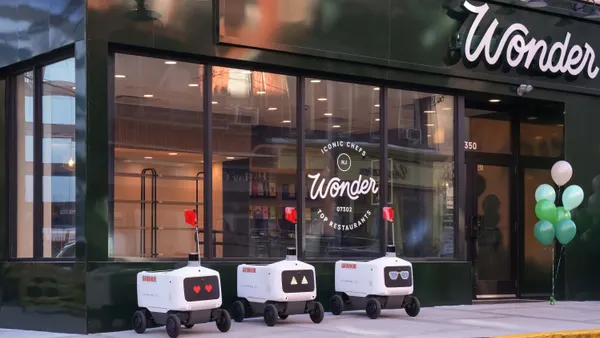Dive Brief:
- Postmates has secured a $225 million investment from private equity firm GPI Capital, bringing the company's valuation to $2.4 billion, according to Forbes.
- The investment comes prior to a rumored IPO for the fourth largest U.S. delivery company. Postmates confidentially filed for the offering in February when its valuation was $1.85 billion and is expected to officially become public in September.
- For 2018, the tech company reportedly posted revenue of $400 million, but is not profitable.
Dive Insight:
With this latest round of funding, Postmates' valuation has jumped by nearly 30%, but it may not necessarily signal good news for the delivery provider. A funding round so close to an IPO could indicate that it is low on money or is looking to boost its valuation and perhaps fuel more investor confidence, Forbes reports. The company has also been dealing with recent rumors that its delayed IPO could signal that it was instead considering a sale to a larger delivery company, but the platform has since shrugged off these reports.
Postmates would join a crowded Nasdaq with Uber, Grubhub and Waitr already on the market. DoorDash, which was valued at $12.6 billion during the summer, is also believed to be in talks with banks about opening a $400 million line of credit ahead of its IPO.
Postmates has some catching up to do in the delivery space. It boasts only 12% of the delivery market share as of February, compared just over a quarter of market share a piece for Grubhub, Uber Eats and DoorDash. However, Postmates is reportedly growing faster than Uber Eats and Grubhub nationally, and its model has interested a number of venture capitalists, having raised $681 million in private venture funding prior to this round from GPI, according to Pitchbook.
The delivery company has attempted to differentiate itself in the fast-moving delivery space in a number of ways. It teamed up with Square and Bringg to appeal to smaller chains and independent restaurants in May. That's a good place to be. Independent restaurants and small chains make up nearly half of the restaurant industry and are expected to grow at a faster rate than chains through 2020, according to Nation's Restaurant News.
The company also added features like Postmates Party that allows customers to share delivery drivers, Postmates Live where customers can order and pickup food at stadiums and concert venues, and a subscription model, Postmates Unlimited. Postmates is also leaning into the autonomous delivery model and in August got the go-ahead from San Francisco to test its automated robot, Serve.
The tech firm has also been relatively insulated from the labor disputes that have transpired in the category. Further, Postmates recently added benefits for its gig workers that include free occupational accident insurance, health care options and free access to online college courses and professional certifications.
Still, despite the high demand and the intense competition, delivery remains a relatively unproven category with uncertain profitability. Although Uber Eats grew more than 140% year-over-year, for example, its parent company lost more than $5 billion during Q2. Perhaps the biggest question now is whether or not there is enough investor interest to support four (or potentially five) food delivery companies that have yet to turn a profit.










